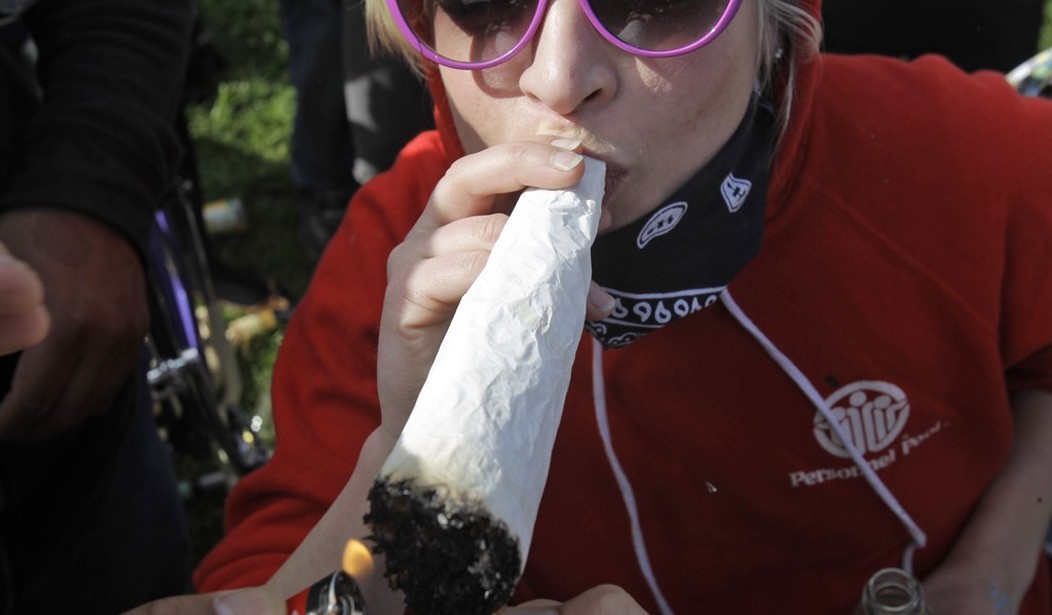We’re already at the point where maybe half the Republican Party takes as its bedrock principles whatever Trump happens to believe on a given day.
Which means, really, the only thing needed to trigger bipartisan support for legalization is one absent-minded pro-legalization presidential comment during a “Fox & Friends” interview. New from CBS:
Sixty-one percent of Americans think marijuana use should be legal, a five-point increase from last year and the highest percentage ever recorded in this poll. Eighty-eight percent favor medical marijuana use.
Seventy-one percent oppose the federal government’s efforts to stop marijuana sales and its use in states that have legalized it, including opposition from most Republicans, Democrats, and independents…
This sentiment cuts across party lines: Majorities of Republicans (63 percent), Democrats (76 percent), and independents (72 percent) oppose the federal government trying to stop marijuana use in these states.
The White House has given mixed signals about whether it intends to crack down on marijuana use in states where it’s legal. Jeff Sessions, an ardent skeptic of legalization, reportedly wasn’t inclined that way as of last month, but Sean Spicer said in February during a briefing that, yes, federal drug laws would be enforced coast to coast. That 71 percent figure, which includes 63 percent of Republicans, gives Trump something to think about. “Law and order” or federalism: His preference might not be clear but the base’s is.
Unless, that is, the CBS numbers are a fluke. But they aren’t. New from Quinnipiac:
American voters say 60 – 34 percent “that the use of marijuana should be made legal in the U.S.,” the highest level of support for legalized marijuana in a Quinnipiac University national poll. Republicans and voters over 65 years old are the only listed party, gender, education, age or racial groups to oppose legalized marijuana…
Voters oppose 73 – 21 percent government enforcement of federal laws against marijuana in states that have legalized medical or recreational marijuana. No group supports enforcement in states where marijuana is legal.
Republican support for federal non-enforcement in states where the drug is legal is lower here at 53/40, but that’s the lowest figure among every subgroup tested. Even grandmas and grandpas in the 65+ set want the feds to leave pro-legalization states alone, 58/29.
There are two key results from the CBS data, I think, that show you why legalization is coming sooner rather than later. One is the data when people are asked whether they think alcohol or marijuana is the more harmful drug. That’s the linchpin for the prohibition on weed, after all; intuitively it makes no sense that a more harmful drug can be bought over the counter at the convenience store while the less harmful one is illegal across most of the country. And yet, that’s where we are according to public opinion. Just seven percent say marijuana is more harmful than alcohol versus 53 percent(!) who say that alcohol is more harmful than marijuana. Among Republicans, the most weed-skeptical group, it’s 14/42. If you’ve lost the battle to convince Americans that pot poses a special threat that booze doesn’t, you’ve lost the battle, period.
The other key result is the age split:

In many polls touching on cultural hot buttons, you’ll see a progression across age groups — young adults are more liberal, the next generation a bit less, the next generation less still, etc. Not here. That’s some drop-off between the solidly pro-legalization 55-64 group and the anti-legalization 65+ group. No mystery why: The former came of age during the 1960s and 70s, when pot use took off, while the latter include many people from the golden days of “Reefer Madness.” Quinnipiac sees the same gap, albeit not as pronounced as CBS does. They also find 60 percent support for legalization among the 50-64 group, but the 65+ group in their data is at 42 percent. Either way, once the oldest generation dies off, there’ll be no going back.
American public opinion is already practically unanimous on medical marijuana, by the way, and I’m not exaggerating much in using that word. CBS has it at 87 percent; Quinnipiac puts it at 94 percent; a third poll published a few days ago by Yahoo News found 83 percent in favor. That’s as good as it gets in today’s polarized American politics. One interesting quirk in the Yahoo poll, though: When they asked about legalizing marijuana, they found a much narrower divide, 49/47, than either CBS or Quinnipiac. How come? I think it may have to do with how they worded the question. CBS and Quinnipiac both asked whether the use of marijuana should be made legal or not; Yahoo, however, asked, “Do you support or oppose legalizing the use of marijuana for recreational use?” The word “recreational” may be carrying a lot of cultural weight there, conjuring images of stoners or large groups of people getting high in public together. I’d be curious to see that question polled with and without that word.
Exit question via lefty Paul Waldman: If Sessions does order a crackdown in states where marijuana is legal, will that trigger a backlash that pushes support for legalization even higher? I’m not so sure. The dynamics of polarization being what they are, any backlash from the pro-weed side is apt to make Republicans circle the wagons around the White House, triggering a counter-backlash. GOPers were split 46/49 on legalizing weed in CBS’s data, tantalizingly close to majority support. If they’re forced to choose between defending Trump on the one hand, though, and siding with his pro-pot critics on the other, it wouldn’t surprise me if they shift a bit against legalization.








Join the conversation as a VIP Member